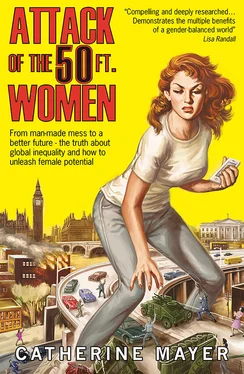The audience whooped in agreement.
‘The questions you’ve all been asking this evening are about not only how we make progress but how we hold onto progress. So what I would like to do is invite anybody who wants to come to the bar afterwards or interact with me on Twitter to consider whether one way of doing this might be to actually found a women’s equality party, one that works with women in the mainstream parties that are doing the good things, and indeed with men in those mainstream parties who are doing the things that need to be done, but works rather in the way of some fringe parties that we’ve seen coming up to push [gender equality] so that it finally really is front and centre of the agendas of mainstream parties. At which point we’d happily dissolve our party, go away and leave the mainstream parties to what they should be doing.’
‘So that is my question. I will be at the bar afterwards.’
‘Are you buying, Catherine?’ asked Creasy.
I could have reduced that whole rambling, unplanned intervention to two observations: old politics was failing and its failure was creating room for change; mainstream parties had lost their core identities and were therefore primed to copy anything that looked like it might be a vote winner. If you build it, they will come.
The growth of the Green Party had provided mulch for green shoots in other parties. When the United Kingdom Independence Party started winning serious support, the other parties gave up challenging its anti-immigration rhetoric and started contorting themselves into UKIP-shaped positions. It wouldn’t be until the results of the EU Referendum the following year that we would begin to see the full consequences of the copycat syndrome, but it was already clear that UKIP didn’t need to be in government to transform Britain. The threat to women posed by a surging UKIP and the success of similar parties in other countries was also becoming evident. They represented a backlash against a whole range of values, including gender equality. ‘The European Parliament, in their foolishness, have voted for increased maternity pay,’ UKIP leader Nigel Farage had tweeted in 2010. ‘I’m off for a drink.’ Why couldn’t a women’s equality party steal from their political playbook to assert the opposite view? Why couldn’t a women’s equality party trigger copycat impulses in the established parties and finally push the interests of the oppressed majority to the top of the political agenda?
People enthused about the idea the moment the words came out of my mouth. They also assumed, to my alarm, that I was proposing to do something to make it a reality. Some followed me to the bar and yet more joined the discussion in the perpetual pub of social media. I returned home to an empty house and an empty fridge and before going to sleep left a message on Facebook to amuse friends who knew of my musician husband’s dedication to eating well. ‘Andy’s only been on tour for 24 hours and I’ve already had a sandwich for dinner. And started a women’s equality party.’ I added: ‘Want to join? Non-partisan and open to men and women.’
‘I’m in!’ replied the writer Stella Duffy almost instantaneously. ‘Me too,’ declared Sophie Walker, a Reuters journalist who could not anticipate just how deeply in she would soon find herself. By the next morning, the thread had lengthened considerably and all the responses were similar.
I called Sandi Toksvig, broadcaster, writer, comedian, and, in the pungent prose of a Daily Mail columnist, ‘a vertically challenged and openly lesbian mother’. She too was on the WOW founding committee and two weeks earlier we had talked at a committee dinner about how to channel the energy the festival always generated into transformative politics. We hadn’t discussed specific mechanisms, so I thought she might be interested to hear about my spontaneous proposal at the Women and Politics event. Her response wasn’t quite as anticipated.
‘But that’s my idea,’ she said. Each year she concocted a show called Mirth Control as a finale for WOW and for 2015 was planning to bring onto the stage cabinet ministers from an imaginary women’s equality party. She’d been on the point of ringing me with a proposition. ‘Darling,’ she said. ‘Do you want to be foreign secretary?’
The idea of someone with no Cabinet experience and a habit of making off-colour jokes becoming the UK’s premier advocate abroad made me laugh, but that was before Theresa May appointed Boris Johnson to the role. However both Sandi and I aspired to see more female secretaries of state.
Days after WOW’s glorious finale, we sat down together and lightly took decisions over a few beers that would disrupt our lives and many others. We decided to give it a go, try to start a party. We swiftly concluded we weren’t the right people to lead it. Sandi is the funniest woman in the world but her wit is a shield that conceals an enduring shyness. She would never have willingly put into the public domain details about her private life – she came out in an interview with the Sunday Times in 1994 – had she not faced twin pressures. Tabloids threatened to reveal her ‘secret’, and she felt compelled to campaign for lesbian and gay rights and equal marriage. Her revelation earned death threats that sent her into hiding with her young children. The last thing she wanted was more disruption. ‘Can we go home yet?’ she asks me, often and plaintively. It’s a joke but there’s always truth to Sandi’s humour.
We also feared we were too metropolitan, too media, to rally the inclusive movement we envisaged. For the party to be effective, it had to be as big and diverse a force as possible. That meant getting away from the assumption that the left had sole ownership of the fight for gender equality. It meant a commitment to a collaborative politics dedicated to identifying and expanding common ground, and that in turn demanded a serious effort to build in diversity from the start. That diversity had to include a wide range of political affiliations and leanings.
Sandi also realised she’d have to give up her job as host of the BBC’s satirical current affairs show, The News Quiz . It was a move her fans didn’t easily forgive. After the announcement, the ranks of my regular trolls swelled with angry Radio Four listeners venting their displeasure.
Even before Sandi’s public involvement, our meetings, advertised only on Facebook and by word of mouth, drew hundreds. From the first such gathering, on 28 March 2015, came confirmation of the party’s name. Some participants argued for ‘Equality Party’, but that risked diffusing the message while potentially reinventing the Labour Party. Others favoured Gender Equality Party as an easier sell to male and gender non-binary voters, but that had the ring of a student society in a comedic campus novel. Sandi has little patience for the discussion, which has continued to flare. ‘We just thought we’d be clear,’ she says. ‘We’re busy women and we didn’t really want our agenda to be a secret.’ ‘Women’s Equality Party’ is direct, unambiguous and produces the acronym WE, pleasingly inclusive if apt to spark toilet humour. Politics, as we would learn at first hand, involves compromise.
Speakers at that first meeting included Sophie Walker, later elected WE’s first leader by the steering committee that also emerged from that meeting. At the second meeting on 18 April we signed off on six core objectives: equal representation, equal pay, an education system that creates opportunities for all children, shared responsibilities in parenting and caregiving, equal treatment by and in the media, and an end to violence against women and girls. In June, our first fundraiser at Conway Hall in London sold out within hours. In July 2015, WE registered as an official party. October saw the launch of our first substantial policy document, compiled in close consultation with experts, campaigning organisations and grassroots support that already amounted to tens of thousands of members and activists. WE raised over half a million pounds by the year end. In May 2016 we secured more than 350,000 votes at our first elections for London Mayor, the London Assembly, the Welsh Assembly and the Scottish Parliament.
Читать дальше












